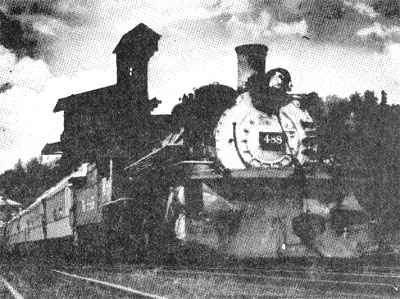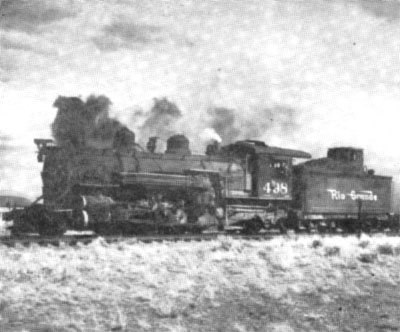
PAUSE AT CHAMA ON THE WAY TO DURANGO, 1960
The first time I walked into the Durango yards a part of history came alive. Here were the trains the bad guys held up, the trains that fought the odds, the trains that challenged the mountains and settled for a temporary victory, the trains that looked like toys, the trains of the Denver and Rio Grande Western Railroad...the trains that I love.
My father is solely responsible for this "thing" I have about trains. I have fond memories of hundreds of visits to the "yards" or the "depot" where we spent hour upon hour watching trains, standing in the spray of steam and roar of cylinders.
Unfortunately, I came along just as the steam engine was fading from the scene. I can remember, slightly, chasing Santa Fe 5,000's across Texas and New Mexico only to be left behind in a cloud of smoke and steam.
But the one railroad that has come to mean "steam railroading to me is the D&RGW. It was in the early fifties when my father and I first walked into the Durango yards to a scene I can never forget.
Steam was everywhere. Durango was truly the narrow gauge capitol of the world. The lines extended east to Alamosa and the Rio Grande mainline, south to Farmington, north to Silverton and the Rio Grande Southern was in its final days with the "Galloping Goose" still running - on occasion or whenever passengers warranted.
I felt just like the kid who has just seen a preview of a coming attraction and couldn't wait to get back. Return I did, with almost ritualistic regularity, to watch, ride and record on film a little bit of yesterday disappearing before the pressures of a changing world.
My mainstay for several years was an annual three—day excursion sponsored by the Rocky Mountain Railroad Club. It was in the late fifties when my father and I were able to make our first trip. I made that first trip riding from Alamosa to Chama, some 95 miles, in an open gondola car eating cinders and smoke and loving every minute of it. That night in Durango, I had to get sunburn oil and chap stick by the dozens. Yup, it was worth it!
But that's how the narrow gauge was. You couldn't get close without getting filthy. Remember one cold morning in the yards to capture one of the "mudhens" first moves after a night's rest. Standing close to the rails I was enveloped in a cloud of steam as the engine chugged by. Only then did I realize that each drop of steam had a drop of oil in it. I was wearing a white jacket!!!
An excursion on the narrow gauge was an experience..... being there at the crack of dawn so you could be on the right side of the train for the best scenery...first off at the photo stops for the best spot...watching in amazement those 44-inch drivers dancing wildly at 30 mph... hours with your head stuck out the window glued to a viewfinder...sitting on the coach steps watching the aspens drift by...and the unforgettable smell of coal.
After each day's trip, you fell into bed completely exhausted, but eager for the next day's activities. Three solid days of narrow gauge mountain steam railroading. What an experience!!!
Between Alamosa and Antonito the narrow gauge is the third rail and the track runs straight as an arrow. It was here that the Mike's could really strut their stuff. On the narrow gauge they didn't get too many chances to open up, but when they did it was an experience to behold!
The churning drivers...the staccato beat of rapid exhausts...the 1880 vintage cars bouncing around so one had to sit, it was impossible to stand.

"STRUTTING" BETWEEN ALAMOSA AND ANTONITO, 1958
Taking water at Antonito, the standard gauge was left behind for it was narrow gauge from here on as the "mike" made its first challenge on the Rockies. Crossing and recrossing the border of New Mexico and Colorado, the tiny train made its way up and over Cumbres Pass into Chama. On our return trip it wouldn't be so easy. We would have to pick up a second engine for the steep climb up to the summit. Then the helper would be cut off and we would follow him down to Alamosa watching as he wound his way down back and forth before us in the valleys below.
Still heading west, we scoot across fertile fields into Durango. If all went well, we would only be an hour or so late, but there were no complaints, even once when we were four hours late pulling in.
The second day was the one we had waited more than a year for...the trip to Silverton. The true picture of an early Colorado ghost town, Silverton was nestled in a valley surrounded on each side by mountains well over 14,000 feet tall, but the highlight of the Silverton branch is the "highline". The most photographed piece of track to be found anywhere in the world.
The "Highline" is the story of the narrow gauge told in less than a mile of track. For it is here that the tiny rails creep along the sheer face of a granite cliff 600 feet above the Rio De Las Animas, the River of Lost Souls. Blasted from solid rock, the roadbed hugs the cliff as the train keeps to the 5 mph mandatory speed limit. Wheel flanges reach a wailing squeal as the wheels fight the tight curve of the rails.